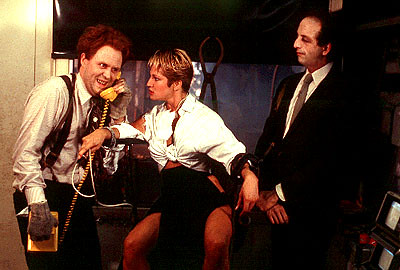
It's all well and good that some of the Supremes who handed Bush the presidency are still claiming it was the right decision. But would it kill the author of "Supreme Conflict" and those writing articles about that book to at least try and acquaint themselves with the decision and politics surrounding Bush v. Gore, the constitution of the United States (especially the equal protection clause) and the media consortium recount findings that O'Connor tries to hide behind? I mean it's seven years after the fact, you'd think they might have the time to be able to do a little background before putting pen to paper. Is that really asking too much?
Just a few examples-
"A no-brainer! A state court deciding a federal constitutional issue about the presidential election? Of course you take the case," Kennedy told ABC News correspondent Jan Crawford Greenburg in her new book, "Supreme Conflict."
Yeah, that is nuts. Except for the fact that the U.S. constitution reads- "Each state shall appoint, in such manner as the Legislature thereof may direct, a number of electors, equal to the whole number of Senators and Representatives to which the State may be entitled in the Congress: but no Senator or Representative, or person holding an office of trust or profit under the United States, shall be appointed an elector. "
The legislature of the state of Florida set down the rules for the election of Presidential electors from that state prior to the 2000 election. They provided rules for a recount in a disputed election. The Secretary of State chose not to enforce those same rules for recounts in certifying the electors before the recounts were complete and owing to her allegiance to one of the candidates. The legal challenge in Florida was simply an effort for to force the state election apparatus which was solely under the control of one of the candidates to actually follow Florida election law as provided by the U.S. Constitution. There is no federal constitutional issue there that would justify the intervention of the supreme court.
A "no-brainer" indeed, Kennedy. Perhaps you actually should have used yours.
In a decision made public on the evening of Dec. 12, 2000, the court said the recount violated the Constitution's Equal Protection Clause because Florida counties were allowed to set their own standards for determining whether to count a vote.
This is of course the square peg the prevailing five justices pounded into the round hole of their decision giving Bush the election. The Equal Protection Clause- "Section 1. All persons born or naturalized in the United States, and subject to the jurisdiction thereof, are citizens of the United States and of the state wherein they reside. No state shall make or enforce any law which shall abridge the privileges or immunities of citizens of the United States; nor shall any state deprive any person of life, liberty, or property, without due process of law; nor deny to any person within its jurisdiction the equal protection of the laws. "
The majority members of the U.S. Supreme Court decided that the Florida Supreme Court was unconstitutionally depriving George W. Bush's right of "life, liberty or property" which was an obvious grievous injustice. To right this justice they simply decided that the rights of the millions of people who voted for Gore in Florida and nationwide need to be set aside so that this wrong could be righted. Let's not even get into the question of whether there was something for Bush to lose to begin with. To accept this argument you have to take at face value that Bush "won" before all of the votes had been counted. Bush couldn't have been deprived of a right he hadn't yet earned through election. The reasoning is just plain nuts.
Still, O'Connor said the outcome of the election would have been the same had the court not intervened.
She was referring to media consortium study that suggested Bush would have won a recount limited to counties that Gore initially contested, although other studies said Gore might have prevailed in a statewide recount.
You mean the that found Gore would have won in all cases under all standards except under the strict requirements and four county recount strategy he was ironically employing at the time? A full statewide recount under any counting standard, something the Florida Supreme Court would've almost assuredly have ordered had they been allowed to proceed, would have given the presidency to Gore.
I'm sure O'Connor, Kennedy and Scalia would love history to remember them well in light of this incident. It won't. It simply can't. Their disgustingly political extra-constitutional decision will stand as a black mark on their names and the history of the court they served on, far into the future.
































4 comments:
Yea, it's pretty shameful the Supreme Court shirked their duty to Americans.
By this same standard of letting (southern) states do "whatever" they decide is "right" in federal issues, they'd still have Jim Crow laws on the books-and Rosa would've died in jail while her decendants still sat riding at the back of the bus.
(yea, I know she didn't have kids, but ya know what I mean).
The Supreme Court's nakedly political decision in the Gore case will go down with Dred Scott and Plessy v Ferguson as one of the Court's worst moments. Your destruction of the majority's pathetic justifications is excellent, Dean.
Thanks Aaron!
Coming from a member of the bar that means a lot.
:-)
By this same standard of letting (southern) states do "whatever" they decide is "right" in federal issues, they'd still have Jim Crow laws on the books-and Rosa would've died in jail while her decendants still sat riding at the back of the bus.
Yeah, it's turning equal protection upside down. Hard to believe the justices aren't hiding from this stupid decision at this point.
Post a Comment